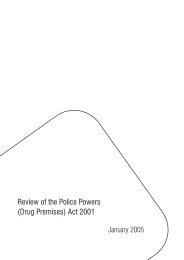Crimes (Forensic Procedures) Act 2000 - NSW Ombudsman - NSW ...
Crimes (Forensic Procedures) Act 2000 - NSW Ombudsman - NSW ...
Crimes (Forensic Procedures) Act 2000 - NSW Ombudsman - NSW ...
You also want an ePaper? Increase the reach of your titles
YUMPU automatically turns print PDFs into web optimized ePapers that Google loves.
procedure be carried out, the police officer must be satisfied that “the carrying out of the forensic procedure without<br />
consent is justified in all the circumstances” 528 – which is quite different. Carrying out a forensic procedure against a<br />
person’s will is much more intrusive than merely asking for consent to a procedure. It is, in effect, an assault. Another<br />
difference is that to order a procedure be carried out a suspect must be under arrest.<br />
We found that some officers do not fully understand these differences and regard the consent process as an<br />
opportunity for the suspect to elect how a DNA sample will be taken – by buccal swab if the suspect consents,<br />
otherwise by hair sample – rather than an opportunity for the suspect to decline to undergo the proposed procedure.<br />
It’s strange – you ask people for their consent but if they say no, you can get it anyway. 529<br />
I find the whole concept of consent for forensic procedures illogical. 530<br />
Further, many officers see it as their role to encourage suspects to consent to a forensic procedure. One explained:<br />
I always have a word before going in to gauge whether they’ll do it... Generally you talk people around. When<br />
they realise you can get it, they come round. So I have a fair idea before going in whether they’ll consent. [I tell<br />
them] let’s just do the swab – otherwise it’s going to be painful for you. 531<br />
Another officer explained that he tells suspects:<br />
We can do this the pleasant way or the unpleasant way, either way we’ll do it, so you may as well [consent]. 532<br />
We found other evidence of police officers convincing suspects to consent to forensic procedures when initially they<br />
declined. A number of officers had written on consent forms, as to whether the suspect consented or not, “No Yes.”<br />
Others crossed out consent forms which indicated the suspect did not consent, and on the following form indicated<br />
they did. For example, one form we examined indicated that when asked whether he consented to the carrying out of<br />
a forensic procedure, the suspect replied, “I object to it. No.” The form was crossed out and marked “see next entry.”<br />
The following form indicates that the suspect, when asked again whether he consented to the procedure, replied, “I<br />
object to it but you’re going to do it anyway,” and when asked whether he consented to it, replied “Yes.” There are<br />
also many references in COPS records to suspects changing their minds about consenting to procedures.<br />
Case Study 22<br />
Police arrested an Aboriginal suspect in relation to an assault. When reading out the information sheet, the<br />
testing officer said, “There’s a lot, isn’t there” The suspect replied, “I can’t get it in my head.” When the testing<br />
officer referred to the suspect being under arrest, the suspect said, “I still don’t personally know that I’m under<br />
arrest.” The testing officer told the suspect, “You are under arrest, you’ve been told that you’re under arrest,<br />
informed of your rights and you’ve also been interviewed.” The suspect replied, “I’m sorry, I’m a bit slow, but<br />
I don’t understand, OK” The suspect initially consented to a forensic procedure, but then withdrew consent<br />
before signing the consent form. The testing officer got a senior officer to come in, who told the suspect he<br />
would be held in custody until police obtained a court order authorising the procedure to be conducted. The<br />
suspect did not seek legal advice. He eventually signed the consent form rather than remain in custody any<br />
longer. He did not seek legal advice about the forensic procedure. 533<br />
Case Study 23<br />
Police arrested a suspect in relation to an assault and affray. The suspect agreed to be interviewed about the<br />
matter and admitted being present but denied any involvement in the offence. COPS indicates that he “initially<br />
declined to consent to a forensic procedure, however changed his mind prior to the Senior Officer order being<br />
made.” Police took a DNA sample by consent, and then charged him with the offence. 534<br />
The Police Association of <strong>NSW</strong> has suggested that the request for consent be simplified, and that officers should ask,<br />
“‘Will you consent – Yes/No’ followed by, ‘Do you understand that if you do not consent, police will endeavour to take<br />
a sample by force – Yes/No’” 535 We do not agree to this approach, however, because: firstly it does not reflect the<br />
substantially different criteria which must be satisfied before police can order that a sample be taken in the absence<br />
<strong>NSW</strong> <strong>Ombudsman</strong><br />
DNA sampling and other forensic procedures conducted on suspects and volunteers under the <strong>Crimes</strong> (<strong>Forensic</strong> <strong>Procedures</strong>) <strong>Act</strong> <strong>2000</strong> 97

















